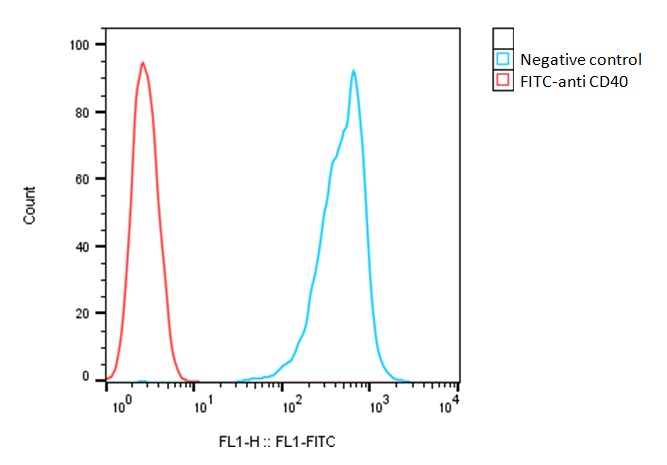
| Catalog Number | Product | Size | Price | |
|---|---|---|---|---|
| C3066 | Human CD40-CHO-K1 Stable Cell Line | 2 vials | $3950 | Order |
| Catalog Number | C3066 |
|---|---|
| Cell Line Name | Human CD40-CHO-K1 Stable Cell Line |
| Accession Number | NP_001241.1 |
| Host Cell | Adherent CHO-K1 |
| Quantity | Two vials of frozen cells (2x106 per vial) |
| Culture Medium | DMEM with 10% FBS, 4 µg/ml puromycin |
| Freezing Medium | 90% FBS and 10% DMSO |
| Storage | Liquid nitrogen upon receipt |
| Product Datasheet: | Download PDF |
Detection of human CD40 expression on human CD40-CHO-K1 stable cells using a monoclonal antibody specific for human CD40 (BioLegend, Cat. #334306)

CD40 is a cell surface glycoprotein and a member of the tumor necrosis factor receptor (TNFR) superfamily. It is primarily expressed on B cells, dendritic cells, and antigen-presenting cells, but it can also be found on other immune and non-immune cells. The primary function of CD40 is to facilitate communication and collaboration between different components of the immune system. CD40 serves as a receptor for CD40 ligand (CD40L or CD154), which is primarily expressed on activated T cells. When CD40 on antigen-presenting cells (APCs) interacts with CD40L on T cells, it initiates a series of signaling events essential for various immune responses such as B cell activation, dendritic cell function, isotype switching in B cells and memory T cell development. Aberrant CD40 expression has been observed in various cancers. Some cancers, such as B-cell lymphomas and multiple myeloma, can overexpress CD40. contributing to tumor cell survival and immune evasion. Targeting CD40 in these cancers with agonistic antibodies or CD40L-based therapies has shown promise in preclinical and clinical studies.
Elgueta R, Benson MJ, de Vries VC, Wasiuk A, Guo Y, Noelle RJ. "Molecular mechanism and function of CD40/CD40L engagement in the immune system." Immunol Rev. 229(1):152-72. 2009.
Vonderheide RH. "CD40 Agonist Antibodies in Cancer Immunotherapy." Annu Rev Med. 69:243-254. 2018.